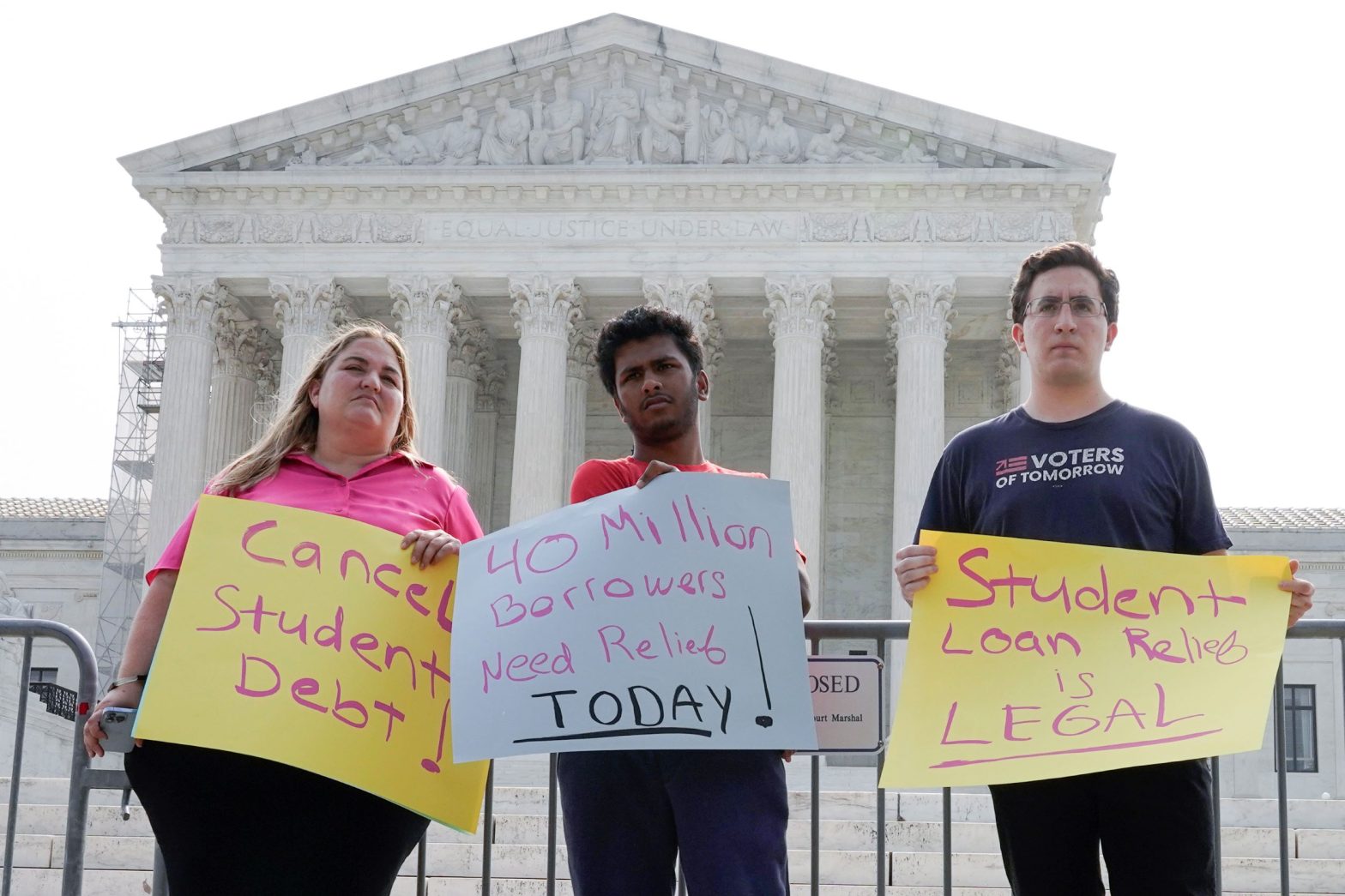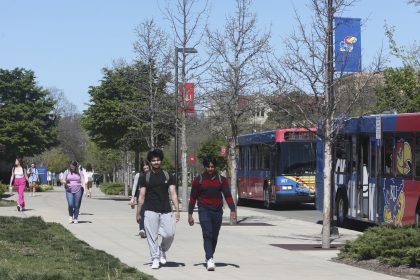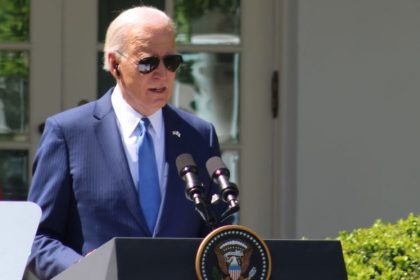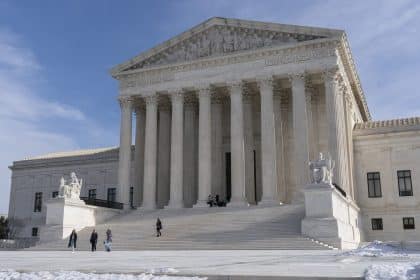Supreme Court Tosses Biden’s Debt Forgiveness Plan

WASHINGTON — The Supreme Court on Friday struck down President Joe Biden’s plan to cancel a portion of the student debt owed by millions of borrowers, declaring that the policy change the administration sought was so sweeping it required congressional authorization.
As is often the case when the court hands down its final rulings of a term, Friday’s decision and dissent were sharply divided along ideological lines, with the court’s current conservative supermajority and its liberal minority voting as blocks in the 6-3 ruling.
Writing for the majority, Chief Justice John Roberts Jr. said the basic question in the case came down to “not whether something should be done” but “who has the authority to do it.”
As previously reported by The Well News, the case centered on interpretations of the HEROES Act, a law enacted after the Sept. 11, 2001, terrorist attacks that gave the secretary of education the power to “waive or modify any statutory or regulatory provision” to protect borrowers impacted by the national crisis.
In 2003, Congress expanded that power to include borrowers affected by “a war or other military operation or national emergency.”
Subsequently, both former President Donald Trump and Biden invoked the HEROES Act to pause student loan repayments and suspend the accrual of interest.
Last summer, with the end of the repayment pause looming, Biden came up with a new plan to stave off the impact of potentially crushing debt on a still healing economy by proposing to forgive $10,000 in debt for individuals earning less than $125,000 per year, or $250,000 per household, and $20,000 for those who received Pell Grants for low-income families.
The loan forgiveness program, the White House said, would ensure that “borrowers are not in a worse position financially due to the pandemic” when their repayments resumed.
In a brief filed with the court prior to oral arguments, Solicitor General Elizabeth Prelogar argued “the plain language of the HEROES Act authorizes the plan.”
“The operative text empowers the secretary to respond to a ‘national emergency’ by ‘waiv[ing] or modify[ing] any statutory or regulatory provision’ governing the federal student loan programs in order to ‘ensure’ that affected student-loan borrowers are not ‘placed in a worse position financially’ in relation to their loans because of the emergency,” Prelogar wrote.
“Here, the secretary responded to the devastating economic consequences of the COVID-19 pandemic by granting targeted relief to borrowers at higher risk of delinquency and default due to the pandemic — specifically, by waiving and modifying certain provisions governing student-loan cancellation and discharge. That relief falls squarely within the secretary’s express statutory authority,” she said.
But Roberts and his colleagues in the majority said they believe the plan proposed by the Biden administration clearly overstepped the powers Congress intended to give the agency.
Here, Roberts said, the modifications to the existing student loan program were so significant that they in effect “created a novel and fundamentally different loan forgiveness program.”
“While Congress specified in the Education Act a few narrowly delineated situations that could qualify a borrower for loan discharge, the secretary has extended such discharge to nearly every borrower in the country,” the chief justice continued.
“It is ‘highly unlikely that Congress’ authorized such a sweeping loan cancellation program through such a subtle device as permission to ‘modify,’” he added.
What Roberts was doing here was invoking the so-called “major questions doctrine,” a term the Supreme Court never used in a majority opinion before 2022, but has become more prominent under the current conservative majority.
As described by the Congressional Research Service, those who rely on the doctrine assert that if an agency seeks to decide an issue of major national significance, its action must be supported by clear congressional authorization.
“Under the government’s reading of the HEROES Act, the secretary would enjoy virtually unlimited power to rewrite the Education Act,” Roberts wrote.
Later he said this unchecked authority would give the secretary of Education the power not only to modify and waive certain provisions, but to “fill the holes that action creates with new terms … no matter how drastic those terms might be — and to ‘alter [provisions] to the extent [he] think[s] appropriate.’”
In a footnote, Roberts observes, “The dissent complains that our application of the major questions doctrine is a ‘tell’ revealing that ‘normal’ statutory interpretation cannot sustain [our] decision. Not so. As we have explained, the statutory text alone precludes the secretary’s program.”
As we shall see, Roberts will have more to say on the dissent later.
Biden responded to the ruling early Friday by declaring that “this fight is not over.”
And he was expected to say more on the matter Friday afternoon.
But in an initial response released by the White House, Biden said the administration’s student debt relief plan “would have been the lifeline tens of millions of hardworking Americans needed as they try to recover from a once-in-a-century pandemic.”
“Nearly 90% of the relief from our plan would have gone to borrowers making less than $75,000 a year, and none of it would have gone to people making more than $125,000,” the president said. “It would have been life-changing for millions of Americans and their families. And it would have been good for economic growth, both in the short- and long-term.
“While today’s decision is disappointing, we should not lose sight of the progress we’ve made — making historic increases to Pell Grants; forgiving loans for teachers, firefighters and others in public service; and creating a new debt repayment plan, so no one with an undergraduate loan has to pay more than 5% of their discretionary income,” Biden continued.
“I believe that the court’s decision to strike down our student debt relief plan is wrong. But I will stop at nothing to find other ways to deliver relief to hardworking, middle-class families. My administration will continue to work to bring the promise of higher education to every American,” he said.
Justice Amy Coney Barrett penned a concurring opinion that was mainly a defense of the major questions doctrine.
In a nutshell, what she wrote was that, “We … ‘expect Congress to speak clearly if it wishes to assign to an agency decisions of vast “economic and political significance.”’ That clarity may come from specific words in the statute, but context can also do the trick.
“Surrounding circumstances, whether contained within the statutory scheme or external to it, can narrow or broaden the scope of a delegation to an agency,” Barrett said.
In a scathing dissent in which she was joined by Justices Sonia Sotomayor and Ketanji Brown Jackson, Justice Elena Kagan slammed the majority for exceeding “its proper, limited role in our nation’s governance.”
“The court’s first overreach in this case is deciding it at all,” she said.
“Under Article III of the Constitution, a plaintiff must have standing to challenge a government action. And that requires a personal stake — an injury in fact. We do not allow plaintiffs to bring suit just because they oppose a policy. Neither do we allow plaintiffs to rely on injuries suffered by others,” Kagan said.
“Those rules may sound technical, but they enforce fundamental limits on federal judicial power. They keep courts acting like courts. Or stated the other way around, they prevent courts from acting like this court does today,” she continued.
“The plaintiffs in this case are six states that have no personal stake in the secretary’s loan forgiveness plan. They are classic ideological plaintiffs: They think the plan a very bad idea, but they are no worse off because the secretary differs. In giving those states a forum — in adjudicating their complaint — the court forgets its proper role. The court acts as though it is an arbiter of political and policy disputes, rather than of cases and controversies,” Kagan said.
“And the court’s role confusion persists when it takes up the merits,” the justice continues. “For years, this court has insisted that the way to keep judges’ policy views and preferences out of judicial decision-making is to hew to a statute’s text.
“The HEROES Act’s text settles the legality of the secretary’s loan forgiveness plan. The statute provides the secretary with broad authority to give emergency relief to student-loan borrowers, including by altering usual discharge rules. What the secretary did fits comfortably within that delegation,” Kagan writes.
“But the court forbids him to proceed. As in other recent cases, the rules of the game change when Congress enacts broad delegations allowing agencies to take substantial regulatory measures. Then, as in this case, the court reads statutes unnaturally, seeking to cabin their evident scope.
“And the court applies heightened-specificity requirements, thwarting Congress’ efforts to ensure adequate responses to unforeseen events. The result here is that the court substitutes itself for Congress and the executive branch in making national policy about student-loan forgiveness,” she added.
“Congress authorized the forgiveness plan (among many other actions); the secretary put it in place; and the president would have been accountable for its success or failure. But this court today decides that some 40 million Americans will not receive the benefits the plan provides, because (so says the court) that assistance is too ‘significan[t],’” Kagan concludes.
Roberts was clearly disturbed by Kagan’s dissent, so much so that he placed an addendum on his opinion advising the public not to interpret Kagan’s dissent as a sign of personal discord among the justices.
“It has become a disturbing feature of some recent opinions to criticize the decisions with which they disagree as going beyond the proper role of the judiciary,” Roberts said.
“Our precedent — old and new — requires that Congress speak clearly before a department secretary can unilaterally alter large sections of the American economy. We have employed the traditional tools of judicial decision-making in doing so. Reasonable minds may disagree with our analysis — in fact, at least three do.
“We do not mistake this plainly heartfelt disagreement for disparagement. It is important that the public not be misled either. Any such misperception would be harmful to this institution and our country,” Roberts said.
Dan can be reached at [email protected] and @DanMcCue
























